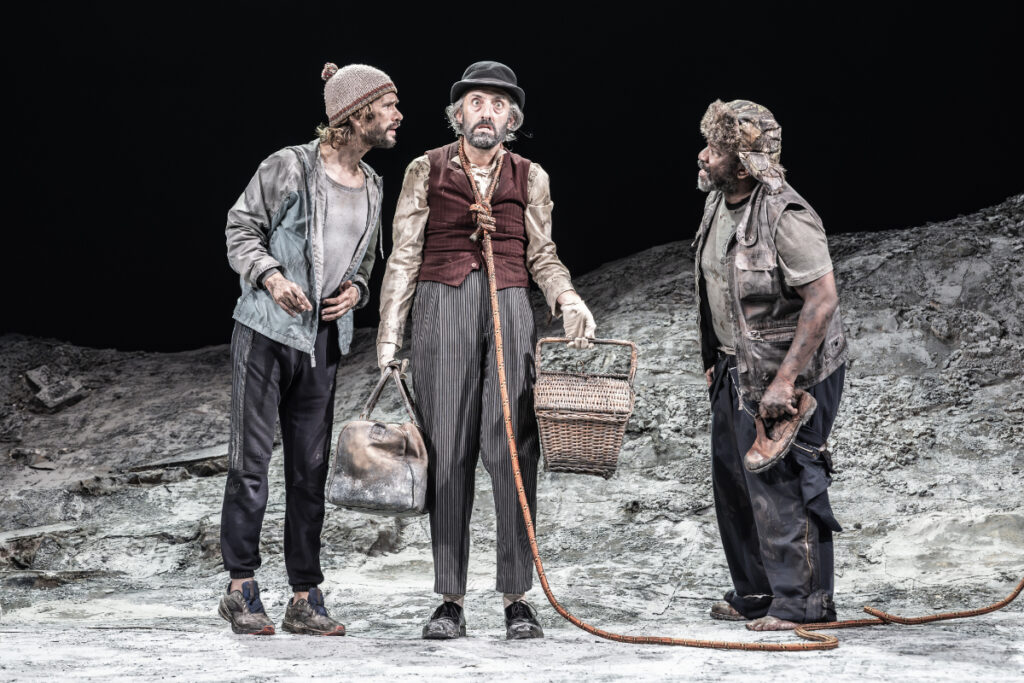
Theatre of the absurd is supposed to reflect the reality we live in, amplifying and warping it for greater impact. ‘Waiting for Godot’ is, if I am not mistaken, the defining piece of the genre, and it truly has earned that accolade. It absorbs your thoughts within its narrative and spits them right out at you with surprising poignancy.
This is not the first time I watched a production of Godot; I have such a vivid memory of the experience from a quarter of a century ago, especially of how it felt tedious on purpose. This time, however, I did not experience weariness, rather I was overwhelmingly engaged throughout. You cannot be bored when you are constantly on tenterhooks, overcome with the realisation that the play does not feels absurd anymore and the reality is not at all distorted.
I was first struck by the portrayal of the capture of mainstream media – reporting is no longer objective, but curated to fit a prescribed narrative; freedom of speech is curtailed, obviously for our own protection:
Vladimir: One out of four. Of the other thee two don’t mention any thieves at all and the third says that both of them abused [the Saviour] (…) one of the four says that one of the two was saved.
Estragon: Well? They don’t agree, and that’s all there is to it.
Vladimir: But all four were there. And only one speaks of a thief being saved. Why believe him rather than the others?
Estragon: Who believes him?
Vladimir: Everybody. It’s the only version they know.
Next, I could not help but gasp at the brilliant depiction of the insanity that is gender ideology. Estragon, as is typical, probably because of his gluttonous nature, was portrayed as more corpulent. Vladimir on the other hand is almost emaciated. And yet, this dialogue follows:
Estragon: What about hanging ourselves?
Vladimir: Hmm. It’d give us an erection! (…) No no, you first.
Estragon: Why me?
Vladimir: You’re lighter than I am.
The thin character calling that other one ‘lighter’ should seem ridiculous, as should the fat character agreeing with the statement. But sitting in the audience you realise that this is our everyday now: the AGP man (note the erection referenced) demanding accommodation in a women’s prison; the boy playing on the girls’ football team and using their changing room. These males demanding to be referred to as female, expecting everyone to affirm them and deny reality or be called a bigot. Facts no longer matter; delusions are the new truth.
Beyond the almost uncanny depiction of the madness happening today, are many truths that I imagine will remain pertinent always. For example, politicians refusing to give straightforward answers as depicted in the scene where Pozzo is asked to explain why Lucky does not put down the bags:
Estragon: Why doesn’t he put his bags down?
Pozzo: But that would surprise me.
Vladimir: You’re being asked a question.
Pozzo: A question? Who? What? (…)
And there are those mysteries one revisits at every interaction with the script, arriving at a different conclusion each time. Does the endless wait represent futility or our inability to take action? Does it represent our quest to find excuses for not taking responsibility for our lives? Do we create mountains out of molehills, turning the tiniest of issues into insurmountable problems, excusing ourselves from having to deal with real challenges? Is the boy god testing us? Is the boy the devil keeping us from acting? Or is the boy Godot himself – the salvation or solution that comes but we fail to see it and we let it slip through our fingers?
There was something in that production from long ago where I felt mounting frustration and the pain of characters; the inevitable pointlessness of existence overwhelmed me. I did not have a similar experience this time. Maybe that is because I was laughing so often. The humour felt a bit slapstick as opposed to dry irony that builds in the depths of your soul but the smile does not even tickle your lips. At times it seemed to overshadow the superb acting and snap the tension in half. It also seemed at odds with the brilliant staging of the play on what looks like a bleak volcanic rock suspended between nothingness. The desolation was so stark and I cannot help but wonder whether this was an attempt to draw a parallel between the carnage wrought by the second world war that inspired Beckett to write this play, and the potential consequences of an environmental catastrophe that so many are predicting today.
But overall, whilst a very different experience to the one I had expected, it was a brilliant one. A play that has earned its place in the pantheon, delivered with acting prowess on a breathtaking stage. Who could ask for more?